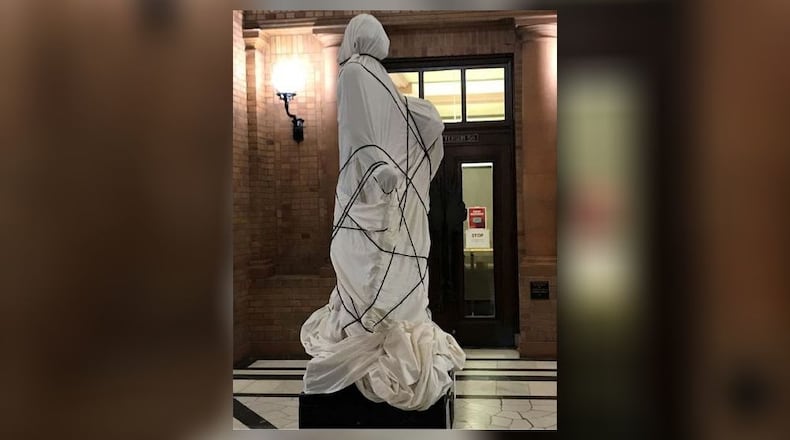Protestors, including Black Lives Matter among other groups, said those monuments were tainted by racism attributed by some to the nation’s past leaders.
A complaint in October from a retired Miami professor and others coincided with the removal of the covering of the statue honoring America’s first president.
Miami officials, however, said the tarp covering was always meant to be temporary as part of the class project and was removed for that reason.
Then earlier this month, the national digital publication Campus Reform posted an article on the class project’s role in covering up the Washington statue on Miami’s Oxford campus.
A statement released by Miami spokeswoman Carole Johnson to the Journal-News said “the project was designed to engage students and the larger university community in a series of conversations about race, racism, and the meaning of monuments in our nation.
“The George Washington statue was the subject of a temporary art installation - titled “What about George?”- organized by the Architecture and Interior Design Department for several weeks in September and October. The tarp on the statue that was part of the installation has since been removed.”
Credit: Connor Moriarty
Credit: Connor Moriarty
She said the class project “is one of several interdisciplinary projects slated to take place throughout this academic year. Responding artistically and educationally to major national issues is a time-honored method of artistic expression.”
Johnson said there are no plans to re-cover the statue, which was donated to Miami in 1920, or alter any other statues or plaques on the Oxford campus.
A complaint made to school officials from Miami Professor Emeritus J. Marcus Jobe was cited in the Campus Reform article as leading to the school’s decision to remove the tarp.
Jobe is quoted in the article as saying the purpose of the tarp “could be accomplished without covering the beautiful statue gifted to Miami in 1920.”
“The (statue) donor’s intent was to inspire patriotism in all those who observe the statue, especially students,” Jobe said.
About the Author


